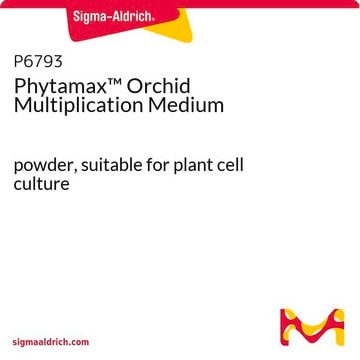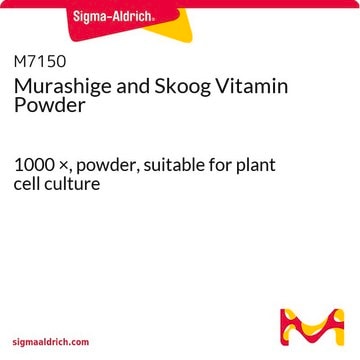C5915
Coconut water
suitable for plant cell culture
Synonyme(s) :
Coconut beverage, Coconut extract, Coconut juice
Se connecterpour consulter vos tarifs contractuels et ceux de votre entreprise/organisme
About This Item
Code UNSPSC :
10171502
Nomenclature NACRES :
NA.72
Produits recommandés
Stérilité
sterile-filtered
Niveau de qualité
Forme
solution
Technique(s)
cell culture | plant: suitable
Application(s)
agriculture
Conditions d'expédition
dry ice
Température de stockage
−20°C
Application
Coconut water is used as a supplement with plant cell culture media such as Murashige & Skoog media.
Use at a concentration of 5-20% (v/v)
Autres remarques
Coconut water has been shown to stimulate shoot proliferation in many species of plants. It is prepared from selected coconuts and processed to remove most of the protein. The product is then filter sterilized and frozen prior to shipment. Remaining protein levels in the water may vary from one lot to the next and may result in precipitate when the product is frozen. This precipitation should not effect the growth of the plant tissue. The precipitate can be removed by filtering or by allowing it to settle to the bottom of the bottle and then decanting. Coconut water can be divided into smaller aliquots, corresponding to your standard medium batch size, and refrozen until needed. Coconut water should be used at a concentration of 5-20% (v/v).
Notes préparatoires
Material is deproteinized
Code de la classe de stockage
10 - Combustible liquids
Classe de danger pour l'eau (WGK)
WGK 3
Point d'éclair (°F)
Not applicable
Point d'éclair (°C)
Not applicable
Équipement de protection individuelle
Eyeshields, Gloves
Certificats d'analyse (COA)
Recherchez un Certificats d'analyse (COA) en saisissant le numéro de lot du produit. Les numéros de lot figurent sur l'étiquette du produit après les mots "Lot" ou "Batch".
Déjà en possession de ce produit ?
Retrouvez la documentation relative aux produits que vous avez récemment achetés dans la Bibliothèque de documents.
Les clients ont également consulté
Porntip Wongkaew et al.
Plant cell reports, 23(6), 426-434 (2004-08-17)
Sugarcane white leaf (SCWL)-diseased sugarcane plants collected from Udornthani Province, in north-eastern Thailand, were the source for tissue culture experiments. Explants from axillary buds, meristem tips, and leaves grew optimally in Murashige-Skoog medium containing 0.5 mg/l alpha-naphthaleneacetic acid, 0.5 mg/l
K P Martin et al.
Indian journal of experimental biology, 43(3), 280-285 (2005-04-09)
Large-scale in vitro propagation protocol for Dendrobium hybrids Sonia 17 and 28, two highly prized commercial cut flower cultivars through shoot multiplication using flower stalk node explants and protocorm-like bodies (PLBs) formation was accomplished. Both hybrids did not exhibit significant
Sungkumlong et al.
Indian journal of experimental biology, 46(4), 243-248 (2008-06-03)
In vitro mass production of C. suaveolens (Lindl.) Hook, an endangered orchid with its snowy white flowers having horticultural potential was accomplished through immature seed culture, and subsequent plant regeneration. The developmental stage of the immature seeds and nutrient media
Suvi T Häkkinen et al.
Plant cell reports, 39(12), 1655-1668 (2020-09-07)
Sustainability and safety aspects of plant cell cultures as food are presented. Applicability of dairy side streams as carbon source and use of natural growth enhancers in cultivation are shown. Biotechnologically produced cellular products are currently emerging to replace and
Notre équipe de scientifiques dispose d'une expérience dans tous les secteurs de la recherche, notamment en sciences de la vie, science des matériaux, synthèse chimique, chromatographie, analyse et dans de nombreux autres domaines..
Contacter notre Service technique

















